哲学的历史发展【英文】
教育哲学的发展历程

教育哲学的发展历程The journey of educational philosophy has traversed a rich and diverse path, evolving over centuries to encapsulate various theories and perspectives. Tracing its origins, we find that early philosophers like Plato and Aristotle pondered over the essence of education, debating its aims and methods. Plato emphasized the cultivation of the soul through rational inquiry, while Aristotle advocated a more practical approach, focusing on the development of virtues through habituation.教育哲学的发展历程经历了丰富而多样的道路,几个世纪以来不断发展,包含了各种理论和观点。
追溯其起源,我们发现诸如柏拉图和亚里士多德等早期哲学家对教育的本质进行了深思,对教育目的和方法进行了辩论。
柏拉图强调通过理性探究来培养灵魂,而亚里士多德则主张一种更为实用的方法,即通过习惯养成来发展美德。
The Medieval era saw a shift towards religious education, with the church playing a pivotal role in shaping educational systems. The Renaissance, on the other hand, marked a rebirth of classical learning, emphasizing humanism and the importance of individuality in education.中世纪时期,教育转向了宗教教育,教堂在塑造教育体系中发挥了关键作用。
19世纪哲学发展【英文】
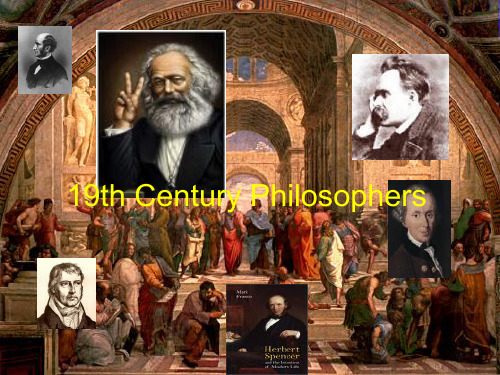
Kant's "Copernican revolution", that placed the role of the human subject or knower at the center of inquiry into our knowledge, such that it is impossible to philosophize about things as they are independently of us or of how they are for us; his invention of critical philosophy, that is of the notion of being able to discover and systematically explore possible inherent limits to our ability to know through philosophical reasoning; * his creation of the concept of "conditions of possibility", as in his notion of "the conditions of possible experience" -- that is that things, knowledge, and forms of consciousness rest on prior conditions that make them possible, so that to understand or know them we have to first understand these conditions; * his theory that objective experience is actively constituted or constructed by the functioning of the human mind; * his notion of moral autonomy as central to humanity; * his assertion of the principle that human beings should be treated as ends rather thNovember 28, 1820 – August 5, 1895) was a German social scientist and philosopher, who developed communist theory alongside his better-known collaborator, Karl Marx, co-authoring The Communist Manifesto (1848). Engels also edited the second and third volumes of Das Kapital after Marx's death.
西方哲学的发展历程
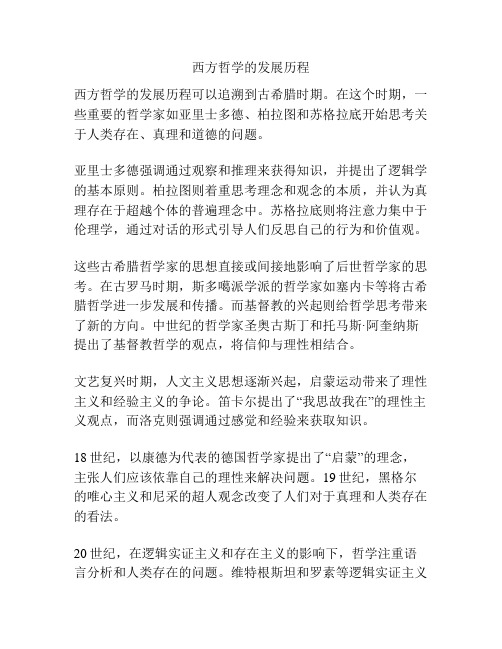
西方哲学的发展历程
西方哲学的发展历程可以追溯到古希腊时期。
在这个时期,一些重要的哲学家如亚里士多德、柏拉图和苏格拉底开始思考关于人类存在、真理和道德的问题。
亚里士多德强调通过观察和推理来获得知识,并提出了逻辑学的基本原则。
柏拉图则着重思考理念和观念的本质,并认为真理存在于超越个体的普遍理念中。
苏格拉底则将注意力集中于伦理学,通过对话的形式引导人们反思自己的行为和价值观。
这些古希腊哲学家的思想直接或间接地影响了后世哲学家的思考。
在古罗马时期,斯多噶派学派的哲学家如塞内卡等将古希腊哲学进一步发展和传播。
而基督教的兴起则给哲学思考带来了新的方向。
中世纪的哲学家圣奥古斯丁和托马斯·阿奎纳斯提出了基督教哲学的观点,将信仰与理性相结合。
文艺复兴时期,人文主义思想逐渐兴起,启蒙运动带来了理性主义和经验主义的争论。
笛卡尔提出了“我思故我在”的理性主义观点,而洛克则强调通过感觉和经验来获取知识。
18世纪,以康德为代表的德国哲学家提出了“启蒙”的理念,主张人们应该依靠自己的理性来解决问题。
19世纪,黑格尔的唯心主义和尼采的超人观念改变了人们对于真理和人类存在的看法。
20世纪,在逻辑实证主义和存在主义的影响下,哲学注重语言分析和人类存在的问题。
维特根斯坦和罗素等逻辑实证主义
者强调语言的清晰和逻辑性。
而存在主义者如海德格尔和萨特则关注人类存在的意义和自由的问题。
当代哲学则呈现出多样性和多元化的局面。
从后现代思潮到分析哲学,从女性主义哲学到环境伦理学,各种各样的思想流派使得西方哲学在不同的领域和问题上得到了深入的探讨。
0101哲学一级学科简介
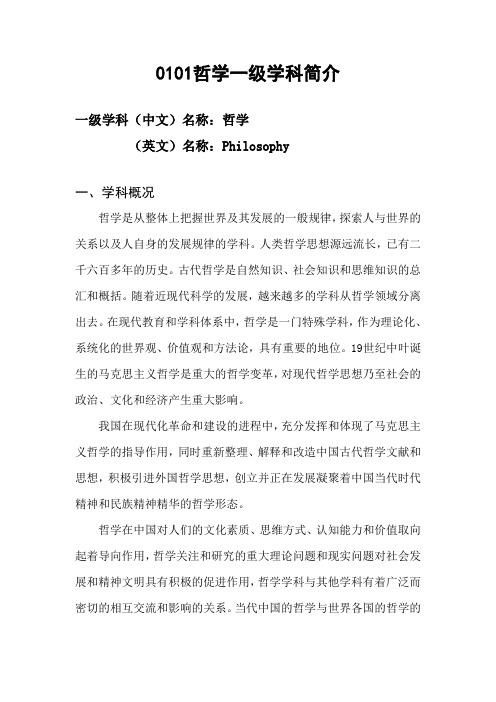
0101哲学一级学科简介一级学科(中文)名称:哲学(英文)名称:Philosophy一、学科概况哲学是从整体上把握世界及其发展的一般规律,探索人与世界的关系以及人自身的发展规律的学科。
人类哲学思想源远流长,已有二千六百多年的历史。
古代哲学是自然知识、社会知识和思维知识的总汇和概括。
随着近现代科学的发展,越来越多的学科从哲学领域分离出去。
在现代教育和学科体系中,哲学是一门特殊学科,作为理论化、系统化的世界观、价值观和方法论,具有重要的地位。
19世纪中叶诞生的马克思主义哲学是重大的哲学变革,对现代哲学思想乃至社会的政治、文化和经济产生重大影响。
我国在现代化革命和建设的进程中,充分发挥和体现了马克思主义哲学的指导作用,同时重新整理、解释和改造中国古代哲学文献和思想,积极引进外国哲学思想,创立并正在发展凝聚着中国当代时代精神和民族精神精华的哲学形态。
哲学在中国对人们的文化素质、思维方式、认知能力和价值取向起着导向作用,哲学关注和研究的重大理论问题和现实问题对社会发展和精神文明具有积极的促进作用,哲学学科与其他学科有着广泛而密切的相互交流和影响的关系。
当代中国的哲学与世界各国的哲学的交流日益频繁和深入,成为促进中外文化交流、增进相互理解的重要思想媒介和精神纽带。
二、学科内涵在长期历史发展中,哲学内部逐渐形成了一系列相对独立而又彼此有机联系着的分支学科。
其中主要有:包括本体论、认识论、社会历史观、方法论和价值论等在内的基本理论,以及关于哲学产生、发展过程和人类认识规律的哲学史。
随着社会、文化和科学的发展,哲学在不同时代所关注的对象、理论形态和研究方法都经历着不同的变化。
现代哲学的重要特征是与自然科学、社会科学、人文学科和新兴学科日益渗透、贯通,由此形成了一系列新的哲学分支学科和交叉学科,它们不但影响着相关学科的理论范式和方法论基础,而且也影响着哲学自身的理论形态和知识结构。
这些分支学科相互影响和渗透,包含着复杂的内容,存在着进一步分化和综合的可能。
西方哲学发展史英语论文
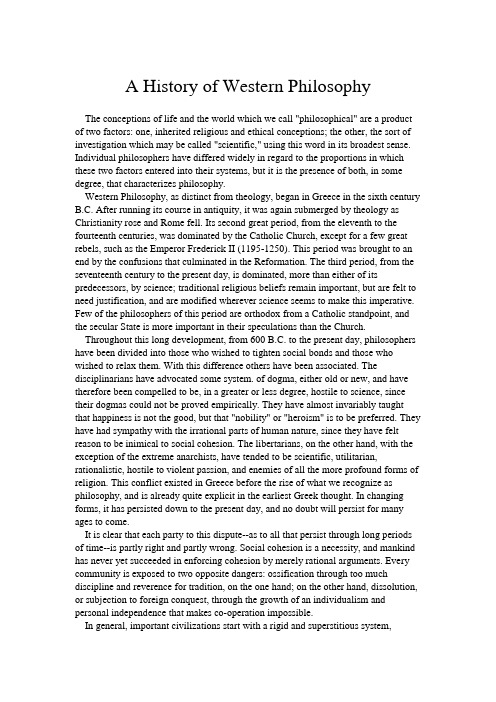
A History of Western PhilosophyThe conceptions of life and the world which we call "philosophical" are a product of two factors: one, inherited religious and ethical conceptions; the other, the sort of investigation which may be called "scientific," using this word in its broadest sense. Individual philosophers have differed widely in regard to the proportions in which these two factors entered into their systems, but it is the presence of both, in some degree, that characterizes philosophy.Western Philosophy, as distinct from theology, began in Greece in the sixth century B.C. After running its course in antiquity, it was again submerged by theology as Christianity rose and Rome fell. Its second great period, from the eleventh to the fourteenth centuries, was dominated by the Catholic Church, except for a few great rebels, such as the Emperor Frederick II (1195-1250). This period was brought to an end by the confusions that culminated in the Reformation. The third period, from the seventeenth century to the present day, is dominated, more than either of its predecessors, by science; traditional religious beliefs remain important, but are felt to need justification, and are modified wherever science seems to make this imperative. Few of the philosophers of this period are orthodox from a Catholic standpoint, and the secular State is more important in their speculations than the Church. Throughout this long development, from 600 B.C. to the present day, philosophers have been divided into those who wished to tighten social bonds and those who wished to relax them. With this difference others have been associated. The disciplinarians have advocated some system. of dogma, either old or new, and have therefore been compelled to be, in a greater or less degree, hostile to science, since their dogmas could not be proved empirically. They have almost invariably taught that happiness is not the good, but that "nobility" or "heroism" is to be preferred. They have had sympathy with the irrational parts of human nature, since they have felt reason to be inimical to social cohesion. The libertarians, on the other hand, with the exception of the extreme anarchists, have tended to be scientific, utilitarian, rationalistic, hostile to violent passion, and enemies of all the more profound forms of religion. This conflict existed in Greece before the rise of what we recognize as philosophy, and is already quite explicit in the earliest Greek thought. In changing forms, it has persisted down to the present day, and no doubt will persist for many ages to come.It is clear that each party to this dispute--as to all that persist through long periods of time--is partly right and partly wrong. Social cohesion is a necessity, and mankind has never yet succeeded in enforcing cohesion by merely rational arguments. Every community is exposed to two opposite dangers: ossification through too much discipline and reverence for tradition, on the one hand; on the other hand, dissolution, or subjection to foreign conquest, through the growth of an individualism and personal independence that makes co-operation impossible.In general, important civilizations start with a rigid and superstitious system,gradually relaxed, and leading, at a certain stage, to a period of brilliant genius, while the good of the old tradition remains and the evil inherent in its dissolution has not yet developed. But as the evil unfolds, it leads to anarchy, thence, inevitably, to a new tyranny, producing a new synthesis secured by a new system of dogma. The doctrine of liberalism is an attempt to escape from this endless oscillation. The essence of liberalism is an attempt to secure a social order not based on irrational dogma, and insuring stability without involving more restraints than are necessary for the preservation of the community. Whether this attempt can succeed or not is only determine by the future..。
西方哲学的发展历程

西方哲学的发展历程西方哲学的发展历程可以追溯到古希腊时期的哲学家们。
在这个时期,一些思想家开始思考人类存在的本质和宇宙的本原。
他们提出了许多关于知识、道德、政治和宇宙的问题,并试图通过逻辑和推理来解决这些问题。
在古希腊时期,最重要的哲学流派是柏拉图学派和亚里士多德学派。
柏拉图主张通过忍耐和哲学的努力来达到智慧的境界,他认为智慧和真理是通过超越感知世界和理性思考获得的。
而亚里士多德则强调通过研究感知世界和实证的方法来获取真理,他的思想对科学方法的发展产生了重要的影响。
接下来的几个世纪,西方哲学在罗马帝国时期以及中世纪的宗教观念的影响下发展。
基督教的兴起使得宗教信仰成为哲学讨论的重要议题。
一些哲学家如奥古斯丁和托马斯·阿奎那致力于将宗教信仰和哲学思考结合起来,试图回答神学和哲学的问题。
文艺复兴时期是西方哲学的重要转折点。
人文主义思想的兴起使得人的自由和个体权利成为哲学讨论的核心议题。
对于理性和经验的重视也成为了一种普遍趋势。
伽利略和笛卡尔等科学家及哲学家的出现,推动了新科学方法的发展,对于理性和经验的解释方法打下了基础。
18世纪是西方哲学史上的重要时期,被称为启蒙时代。
大量的哲学家开始质疑传统的宗教观念和社会制度,主张通过理性和知识来改善人类社会。
伏尔泰、卢梭和康德等思想家的思考拓宽了哲学的领域,涉及到伦理、政治、社会和法律等方面。
到了19世纪,新的思潮和思想流派不断涌现。
马克思主义的出现推动了社会主义和共产主义的思想发展,对于政治、经济和社会的研究产生了重要的影响。
同时,尼采和存在主义的兴起使得对于人类存在和自由意志的思考成为了重要的议题。
20世纪的西方哲学发展如火如荼,包括逻辑学、分析哲学、实证主义、后现代主义等不同的思潮。
逻辑学家如罗素和维特根斯坦开创了逻辑实证主义的学派,试图通过逻辑和语言分析来解决哲学问题。
然而,这一思潮在20世纪中叶逐渐被批判,并在后现代主义思潮的影响下出现了新的哲学思考方法。
关于西方哲学的历程
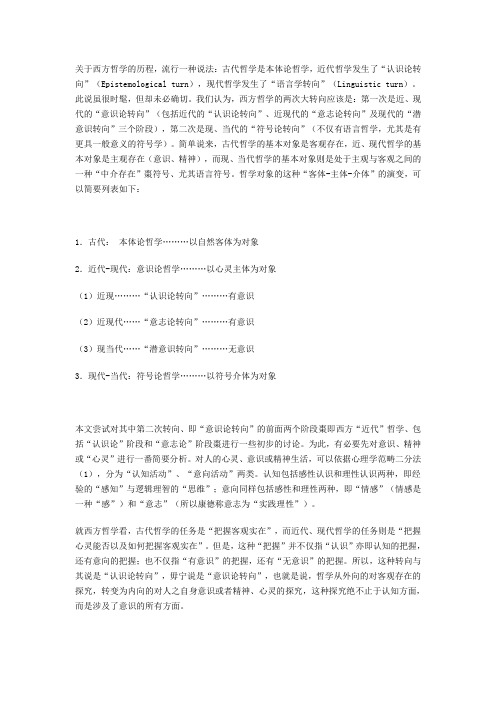
关于西方哲学的历程,流行一种说法:古代哲学是本体论哲学,近代哲学发生了“认识论转向”(Epistemological turn),现代哲学发生了“语言学转向”(Linguistic turn)。
此说虽很时髦,但却未必确切。
我们认为,西方哲学的两次大转向应该是:第一次是近、现代的“意识论转向”(包括近代的“认识论转向”、近现代的“意志论转向”及现代的“潜意识转向”三个阶段),第二次是现、当代的“符号论转向”(不仅有语言哲学,尤其是有更具一般意义的符号学)。
简单说来,古代哲学的基本对象是客观存在,近、现代哲学的基本对象是主观存在(意识、精神),而现、当代哲学的基本对象则是处于主观与客观之间的一种“中介存在”棗符号、尤其语言符号。
哲学对象的这种“客体-主体-介体”的演变,可以简要列表如下:1.古代:本体论哲学………以自然客体为对象2.近代-现代:意识论哲学………以心灵主体为对象(1)近现………“认识论转向”………有意识(2)近现代……“意志论转向”………有意识(3)现当代……“潜意识转向”………无意识3.现代-当代:符号论哲学………以符号介体为对象本文尝试对其中第二次转向、即“意识论转向”的前面两个阶段棗即西方“近代”哲学、包括“认识论”阶段和“意志论”阶段棗进行一些初步的讨论。
为此,有必要先对意识、精神或“心灵”进行一番简要分析。
对人的心灵、意识或精神生活,可以依据心理学范畴二分法(1),分为“认知活动”、“意向活动”两类。
认知包括感性认识和理性认识两种,即经验的“感知”与逻辑理智的“思维”;意向同样包括感性和理性两种,即“情感”(情感是一种“感”)和“意志”(所以康德称意志为“实践理性”)。
就西方哲学看,古代哲学的任务是“把握客观实在”,而近代、现代哲学的任务则是“把握心灵能否以及如何把握客观实在”。
但是,这种“把握”并不仅指“认识”亦即认知的把握,还有意向的把握;也不仅指“有意识”的把握,还有“无意识”的把握。
第一讲:哲学的诞生

主讲:刘畅
第一讲:哲学前史
“哲学”
哲学:philosophia =philos(爱)+sophia(智慧) 日本学者西周把philosophy译作“希哲 学”、“哲学”,这个译名后来又被引介 到中国。
为什么是希腊?
“在全部的历史中,最使人感到惊异或难于解 说的莫过于希腊文明的突然兴起了。构成文明的 大部分东西已经在埃及和美索不达米亚存在了好 几千年,又从那里传播到了四邻的国家。但是其 中却始终缺少某些因素,直到希腊人才把它们提 供了出来。” ——罗素
埃斯库罗斯
苏格拉底
柏拉图 (阿里斯托克勒 )
arche(本原)
亚里士多德:
“本原(arche)就是万物从它那里来,毁灭之 后复归到它那里去,万物生灭变化,唯独它不变 的东西。”
第一个哲学家:泰勒斯
水是万物的本原。
泰勒斯(鼎盛年:前585)
• 水是万物的本原。[大地浮于水上。]
根据:
一切生物的种子都是潮湿的;都以水为必需的养料;
• 对自身文化的反省带来了对异质文化的宽容,也 带来了论理的态度。
“蛮夷人是奴隶,而希腊人是自由人。” ——狄摩西尼
我们的政治制度,不是从我邻人的制度中模 仿得来的。我们的制度是别人的模范,而不是出 自对任何其他人的模仿。我们的制度之所以被称 为民主政治,因为政权是在全体公民手中,而不 是在少数人手中。 ——伯利克里
难以解释的耶利问题
• 遗传学?——几千年来,欧亚人死亡的主因是传染性 疾病,战争状态则是例外。而新几内亚人死亡的主因 则是他杀、长期的部落战争、意外事故和获取食物时 遭遇的危险。
• 既然非洲大陆是人类的故乡,长期的进化优势为什么 仍然使非洲落在世界文明发展的后面?
- 1、下载文档前请自行甄别文档内容的完整性,平台不提供额外的编辑、内容补充、找答案等附加服务。
- 2、"仅部分预览"的文档,不可在线预览部分如存在完整性等问题,可反馈申请退款(可完整预览的文档不适用该条件!)。
- 3、如文档侵犯您的权益,请联系客服反馈,我们会尽快为您处理(人工客服工作时间:9:00-18:30)。
Plato (4Байду номын сангаас7-347)
• The son of wealthy and influential Athenian parents, Plato began his philosophical career as a student of Socrates. When the master died, Plato travelled to Egypt and Italy, studied with students of Pythagoras, and spent several years advising the ruling family of Syracuse. Eventually, he returned to Athens and established his own school of philosophy at the Academy. • Author of The Dialogues
Philosophy As Historical
• philosophical thought evolves • the thought of two different eras are so intimately connected that a genuine understanding of any one of them requires an understanding of the other. • What is important for our purposes is simply to be conscious and sensitive to the importance of history and the historical context in our understanding of philosophical texts.
Pre-Socratics
• • • • • • • • • • • Thales (624-546 B.C) Anaximander (5th cn. B.C.) Anaximenes (585-525 B.C.) Phythagoras (fl. 530 B.C.) Heraclitus (6th cn B.C.) Parmenides (b. 510 B.C.) Zeno (b. 488 B.C.) Empedocles (490-430) Anaxagoras (500-428 B.C.) Leucippus (490-430 B.C.) Democritus (460-370 B.C.)
The History of Philosophy
An Overview
What Is A Historical Overview And What Is Its Benefit?
• The main objective of this overview is to have the tools to properly situate a particular philosopher in their corresponding historical framework.
Aristotle (384-322)
• Aristotle was born in Stagira in north Greece, the son of Nichomachus, the court physician to the Macedonian royal family. He was trained first in medicine, and then in 367 he was sent to Athens to study philosophy with Plato. He stayed at Plato's Academy until about 347
The History of Philosophy
• • • • Ancient Medieval Modern Contemporary
Ancient Philosophy 600 B.C. - Birth of Christ
• • • • • Pre-Socratics The Sophists 3 main philosophers Hellenic Philosophy Stoicism
3 Main Ancient Philosophers
• Socrates (470-399 B.C.E) • Plato (428-348 B.C.E) • Aristotle (384-322 B.C.E)
Socrates (469-399)
• In his use of critical reasoning, by his unwavering commitment to truth, and through the vivid example of his own life, fifth-century Athenian Socrates set the standard for all subsequent Western philosophy.
The Sophists
• • • • • Protagoras (c. 490-c. 420 B.C.) Gorgias (483-378 B.C.) Thrasymachus (c. 459– c. 400 B.C.) Hippias (5th cn. B.C.) Prodicus (fl. 5th cn. B.C.)
Philosophy and Society
• philosophy does not take place in a vacuum, and therefore, the social, scientific, literary, economic and cultural context have a bearing upon the evolution of thought.
